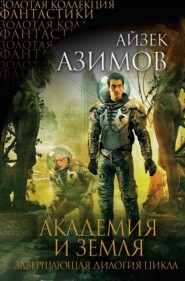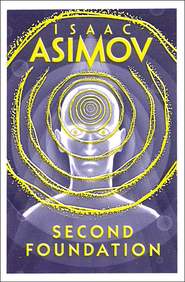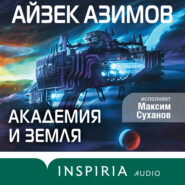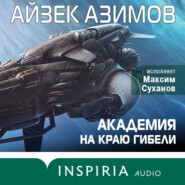По всем вопросам обращайтесь на: info@litportal.ru
(©) 2003-2024.
✖
I, Robot
Настройки чтения
Размер шрифта
Высота строк
Поля
With metal legs eating up the space between himself and his little mistress he charged down from the opposite direction. Everything then happened at once. With one sweep of an arm, Robbie snatched up Gloria, slackening his speed not one iota, and, consequently, knocking every breath of air out of her. Weston, not quite comprehending all that was happening, felt, rather than saw, Robbie brush past him, and came to a sudden bewildered halt. The tractor intersected Gloria’s path half a second after Robbie had, rolled on ten feet further and came to a grinding, long-drawn-out stop.
Gloria regained her breath, submitted to a series of passionate hugs on the part of both her parents and turned eagerly toward Robbie. As far as she was concerned, nothing had happened except that she had found her friend.
But Mrs Weston’s expression had changed from one of relief to one of dark suspicion. She turned to her husband, and, despite her disheveled and undignified appearance, managed to look quite formidable, ‘You engineered this, didn’t you?’
George Weston swabbed at a hot forehead with his handkerchief. His hand was unsteady, and his lips could curve only into a tremulous and exceedingly weak smile.
Mrs Weston pursued the thought, ‘Robbie wasn’t designed for engineering or construction work. He couldn’t be of any use to them. You had him placed there deliberately so that Gloria would find him. You know you did.’
‘Well, I did,’ said Weston. ‘But, Grace, how was I to know the reunion would be so violent? And Robbie has saved her life; you’ll have to admit that. You can’t send him away again.’
Grace Weston considered. She turned toward Gloria and Robbie and watched them abstractedly for a moment. Gloria had a grip about the robot’s neck and would have asphyxiated any creature but one of metal, and was prattling nonsense in half-hysterical frenzy. Robbie’s chrome-steel arms (capable of bending a bar of steel two inches in diameter into a pretzel) wound about the little girl gently and lovingly, and his eyes glowed a deep, deep red.
‘Well,’ said Mrs Weston, at last, ‘I guess he can stay with us until he rusts.’
Susan Calvin shrugged her shoulders, ‘Of course, he didn’t. That was 1998. By 2002, we had invented the mobile speaking robot which, of course, made all the non-speaking models out of date, and which seemed to be the final straw as far as the non-robot elements were concerned. Most of the world governments banned robot use on Earth for any purpose other than scientific research between 2003 and 2007.’
‘So that Gloria had to give up Robbie eventually?’
‘I’m afraid so. I imagine, however, that it was easier for her at the age of fifteen than at eight. Still, it was a stupid and unnecessary attitude on the part of humanity. US Robots hit its low point, financially, just about the time I joined them in 2007. At first, I thought my job might come to a sudden end in a matter of months, but then we simply developed the extra-Terrestrial market.’
‘And then you were set, of course.’
‘Not quite. We began by trying to adapt the models we had on hand. Those first speaking models, for instance. They were about twelve feet high, very clumsy and not much good. We sent them out to Mercury to help build the mining station there, but that failed.’
I looked up in surprise, ‘It did? Why, Mercury Mines is a multi-billion-dollar concern.’
‘It is now, but it was a second attempt that succeeded. If you want to know about that, young man, I’d advise you to look up Gregory Powell. He and Michael Donovan handled our most difficult cases in the teens and twenties. I haven’t heard from Donovan in years, but Powell is living right here in New York. He’s a grandfather now, which is a thought difficult to get used to. I can only think of him as a rather young man. Of course, I was younger, too.’
I tried to keep her talking, ‘If you would give me the bare bones, Dr Calvin, I can have Mr Powell fill it in afterward.’ (And this was exactly what I later did.)
She spread her thin hands out upon the desk and looked at them. ‘There are two or three,’ she said, ‘that I know a little about.’
‘Start with Mercury,’ I suggested.
‘Well, I think it was in 2015 that the Second Mercury Expedition was sent out. It was exploratory and financed in part by US Robots and in part by Solar Minerals. It consisted of a new-type robot, still experimental; Gregory Powell; Michael Donovan—’
2 (#uf5b02f29-07df-5a59-95b7-f38e6b9c7641)
Runaround (#uf5b02f29-07df-5a59-95b7-f38e6b9c7641)
It was one of Gregory Powell’s favorite platitudes that nothing was to be gained from excitement, so when Mike Donovan came leaping down the stairs toward him, red hair matted with perspiration, Powell frowned.
‘What’s wrong?’ he said. ‘Break a fingernail?’
‘Yaaaah,’ snarled Donovan, feverishly. ‘What have you been doing in the sublevels all day?’ He took a deep breath and blurted out, ‘Speedy never returned.’
Powell’s eyes widened momentarily and he stopped on the stairs; then he recovered and resumed his upward steps. He didn’t speak until he reached the head of the flight, and then:
‘You sent him after the selenium?’
‘Yes.’
‘And how long has he been out?’
‘Five hours now.’
Silence! This was a devil of a situation. Here they were, on Mercury exactly twelve hours – and already up to the eyebrows in the worst sort of trouble. Mercury had long been the jinx world of the System, but this was drawing it rather strong – even for a jinx.
Powell said, ‘Start at the beginning, and let’s get this straight.’
They were in the radio room now – with its already subtly antiquated equipment, untouched for the ten years previous to their arrival. Even ten years, technologically speaking, meant so much. Compare Speedy with the type of robot they must have had back in 2005. But then, advances in robotics these days were tremendous. Powell touched a still gleaming metal surface gingerly. The air of disuse that touched everything about the room – and the entire Station – was infinitely depressing.
Donovan must have felt it. He began: ‘I tried to locate him by radio, but it was no go. Radio isn’t any good on the Mercury Sunside – not past two miles, anyway. That’s one of the reasons the First Expedition failed. And we can’t put up the ultrawave equipment for weeks yet—’
‘Skip all that. What did you get?’
‘I located the unorganized body signal in the short wave. It was no good for anything except his position. I kept track of him that way for two hours and plotted the results on the map.’
There was a yellowed square of parchment in his hip pocket – a relic of the unsuccessful First Expedition – and he slapped it down on the desk with vicious force, spreading it flat with the palm of his hand. Powell, hands clasped across his chest, watched it at long range.
Donovan’s pencil pointed nervously. ‘The red cross is the selenium pool. You marked it yourself.’
‘Which one is it?’ interrupted Powell. ‘There were three that MacDougal located for us before he left.’
‘I sent Speedy to the nearest, naturally. Seventeen miles away. But what difference does that make?’ There was tension in his voice. ‘There are the penciled dots that mark Speedy’s position.’
And for the first time Powell’s artificial aplomb was shaken and his hands shot forward for the map.
‘Are you serious? This is impossible.’
‘There it is,’ growled Donovan.
The little dots that marked the position formed a rough circle about the red cross of the selenium pool. And Powell’s fingers went to his brown mustache, the unfailing signal of anxiety.
Donovan added: ‘In the two hours I checked on him, he circled that damned pool four times. It seems likely to me that he’ll keep that up forever. Do you realize the position we’re in?’
Powell looked up shortly, and said nothing. Oh, yes, he realized the position they were in. It worked itself out as simply as a syllogism. The photo-cell banks that alone stood between the full power of Mercury’s monstrous sun and themselves were shot to hell. The only thing that could save them was selenium. The only thing that could get the selenium was Speedy. If Speedy didn’t come back, no selenium. No selenium, no photo-cell banks. No photobanks – well, death by slow broiling is one of the more unpleasant ways of being done in.
Donovan rubbed his red mop of hair savagely and expressed himself with bitterness. ‘We’ll be the laughing stock of the System, Greg. How can everything have gone so wrong so soon? The great team of Powell and Donovan is sent out to Mercury to report on the advisability of reopening the Sunside Mining Station with modern techniques and robots and we ruin everything the first day. A purely routine job, too. We’ll never live it down.’
‘We won’t have to, perhaps,’ replied Powell, quietly. ‘If we don’t do something quickly, living anything down – or even just plain living – will be out of the question.’
‘Don’t be stupid! If you feel funny about it, Greg, I don’t. It was criminal, sending us out here with only one robot. And it was your bright idea that we could handle the photo-cell banks ourselves.’
‘Now you’re being unfair. It was a mutual decision and you know it. All we needed was a kilogram of selenium, a Stillhead Dielectrode Plate and about three hours’ time – and there are pools of pure selenium all over Sunside. MacDougal’s spectroreflector spotted three for us in five minutes, didn’t it? What the devil! We couldn’t have waited for next conjunction.’
‘Well, what are we going to do? Powell, you’ve got an idea. I know you have, or you wouldn’t be so calm. You’re no more a hero than I am. Go on, spill it!’

















